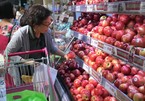 |
Vegetable products are on sale at a food store. Local agro products struggled over the past year to enter China due to its tightened requirements |
Data from the Ministry of Agriculture and Rural Development’s latest report showed that the country last year earned US$3.74 billion from fruit and vegetable exports, down nearly 2% year-on-year.
Although exports of these items to markets such as the United States, the European Union, Japan and the Republic of Korea rose, it was impossible to make up the decline in the country’s vegetable exports to China, Vietnam’s largest buyer of farm produce.
Vietnam exported a total of US$2.24 billion worth of fruits and vegetables to China in the January-November period in 2019, dropping over 13% versus the same period in 2018.
According to this northern neighboring market, information on the origins and packaging of farm produce shipped to China must be registered with Chinese customs. Detailed product traceability labels must also be attached to the goods.
Apart from ensuring the registration of growing area codes and packaging codes to ramp up fruit and vegetable exports to China, local exporters in the field need to improve product quality, particularly in terms of food safety and hygiene, to meet the more stringent requirements of demanding markets in Europe and other countries.
Further, local vegetable firms should focus on investment in technology and modern equipment for their production and processing operations, in addition to intensifying their cooperation with supply chain partners.
To date, nine Vietnamese fruits have been licensed to be shipped to foreign markets: dragon fruit, watermelons, litchi, longan, banana, mango, jack fruit, rambutan and mangosteen. The agriculture ministry is negotiating for the outbound sales of seven more fruits, including durian, avocados, coconuts and passion fruit.
Meanwhile, the export of Vietnamese cassava to China also encountered a fall. In 2019, Vietnam exported over US$970 million worth of cassava and its products, up 1.6% compared with the year-ago figure.
China remained the largest cassava importer of Vietnam, with a market share of almost 90%, but the export value dipped by 1% from the previous year.
The ministry said that China will lower the value added tax for cassava powder imported through official channels from 13% to 10% this year, making prices of this item shipped through border trade less competitive. SGT

Vietnam spends much on vegetables, fruits import
It’s unbelievable but true though Vietnam is one of the planet’s tropical fruit meccas, Vietnamese consumers pour a lot of money on foreign fruits.

Dreaming of clean vegetables
Urban jungles have a lot going for them, but one thing they're missing is space to garden in and grow your own vegetables.
 Local agricultural products struggled to enter China last year due to its tightened import requirements.
Local agricultural products struggled to enter China last year due to its tightened import requirements.